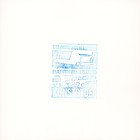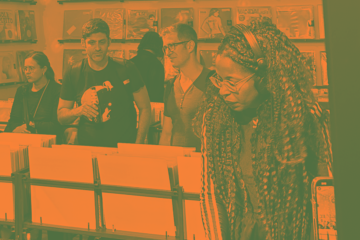You, admittedly, shouldn’t get so hung up on words in music. Especially when it comes to music with no lyrics. But when a record has a title like »Kunststoff«, you can’t help but think it’s great and tip your hat to the ingenious fusion of different conceptual worlds. It can also sometimes be an indication that the person who chose the title is equally inventive with the sounds.
David Moufang aka Move D is one of those people. Not only did he call his 1995 solo début »Kunststoff«, he also filled it with music that still has a great deal to say today. Whether it helped that Move D did not hail from one of the big German techno cities, i.e. Frankfurt am Main, Cologne or Berlin, but from Heidelberg in the Neckar valley, is an open question. In any case, it’s a nice story to imagine that a young man in a university town with no club scene of its own, together with a friend, in this case the graphic designer Jonas Grossmann, founded a record label, Source Records, in the early 1990s and thus attracted international attention.

Kunststoff
Move D also released his first solo album on Source. In listening to it, one could initially consider it to be a product of its time. The productions are not afraid to acknowledge their influence from electronic genres like Intelligent Dance Music (IDM), a style where dancing was often not the main focus. Although it could be argued that with »Kunststoff«, Move D certainly offers an example of intelligent dance music that appeals to both mind and body.
It elegantly dispels a few stereotypes about electronic music from Germany in the same breath. For a long time, ›German‹ electronic sounds were internationally synonymous with the supposedly martial works of Kraftwerk and perhaps the endlessly spinning sequencer orgies of Tangerine Dream, even though, historically speaking, there have also been musicians like Cluster since the 1970s who focused on the playful instead of being cool and strict. It’s just that word hadn’t really gotten around back then.
Artificial paradise, true joie de vivre
While artists like Uwe Schmidt, better known in the 1990s as Atom Heart, were already making serious ambient music alongside the more prevalent Teutonic techno sound, Move D’s solo début took a different approach. Blending the quirky, free-flowing structures of IDM with a playful rhythmic sensibility, he created something akin to a vibrant and upbeat take on electronica. This ranged from jazz-infused breakbeats (»Eastman«) to rumbling downtempo house (»Tribute to Mr Finger«) and even techno-swing (»Amazing Discoveries«).
Move D’s fascination with science fiction and space is given free rein on expansive tracks like »77 Sunset Strip«. Warm, fuzzy chords, echoing bubbles and a childlike glockenspiel melody transport the listener to distant galaxies. A grounding element comes in the form of one of the album’s most intricate and stuttering beats, perfectly complementing the track’s weightless atmosphere.
Move D’s music creates an artificial paradise without any hint of a dystopian future or the typical association of electronic music with something dark and threatening.
Move D
What fans have always loved about this album is perfectly encapsulated in »77 Sunset Strip«: Move D’s music creates an artificial paradise without any hint of a dystopian future or the typical association of electronic music with something dark and threatening.
»Kunststoff«, which at first glance may seem rigid and hermetic, turns out to be quite the opposite. Everything is fluid, permeable and full of life and vitality, without being naively optimistic. After all, optimists are often unfairly perceived as less intelligent than pessimists. If anything, »Kunststoff« is a testament to the power of optimistic intelligence. It’s no coincidence that David Moufang cites the Beatles as one of his greatest inspirations – he’s learned from the best.









